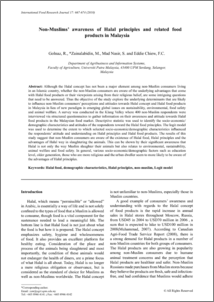Citation
Rezai, Golnaz and Mohamed, Zainal Abidin and Shamsudin, Mad Nasir and Chiew, Eddie Fook Chong
(2010)
Non-Muslims’ awareness of Halal principles and related food
products in Malaysia.
International Food Research Journal, 17 (3).
pp. 667-674.
ISSN 1985-4668; ESSN: 2231-7546
Abstract
Although the Halal concept has not been a major element among non-Muslim consumers living in an Islamic country, whether the non-Muslim consumers are aware of the underlying advantages that come with Halal food products or their viewpoints arising from their religious belief, are some intriguing questions that need to be answered. Thus the objective of the study explore the underlying determinants that are likely to influence non-Muslim consumers’ perceptions and attitudes towards Halal concept and Halal food products in Malaysia in lieu of new paradigm in emerging global issues on sustainability, environmental, food safety and animal welfare. A survey was conducted in the Klang Valley where 400 non-Muslim respondents were
interviewed via structured questionnaires to gather information on their awareness and attitude towards Halal
food products in the Malaysian food market. Descriptive statistic was used to identify the socio-economic/
demographic characteristics and attitudes of the respondents toward the Halal food principles. The logit model was used to determine the extent to which selected socio-economic/demographic characteristics influenced
the respondents’ attitude and understanding on Halal principles and Halal food products. The results of this
study suggest that non-Muslim consumers are aware of the existence of Halal food, Halal principles and the
advantages of Halal way in slaughtering the animals. This can be shown by their significant awareness that Halal is not only the way Muslim slaughter their animals but also relates to environmental, sustainability, animal welfare and food safety. In general, various socio-economic/demographic factors such as education level, older generation, those who are more religious and the urban dweller seem to more likely to be aware of the advantages of Halal principles.
Download File
![[img]](http://psasir.upm.edu.my/style/images/fileicons/application_pdf.png)  Preview |
|
PDF
Non-Muslims_awareness_of_Halal_principles.pdf
- Published Version
Download (411kB)
|
|
Additional Metadata
Actions (login required)
 |
View Item |

